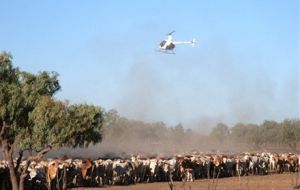MercoPress. South Atlantic News Agency
Land values in northern Australia have fallen 20/25%; valuations in line with productivity
 Greatest threat to northern pastoral productivity is the drying up of finance
Greatest threat to northern pastoral productivity is the drying up of finance Land values in northern Australia have fallen 20-25% since the global financial crisis of 2008, and will continue to fall until valuations are in line with productivity. Meanwhile, says Ross Copland, the Alice Springs-based director of Integrated Valuation Services, the curtailing of live export sales that began in 2011 has flipped perceptions of Territory pastoral productivity.
Northern properties, which pre-2011 had higher valuations because of their proximity to the port, are now at a perceived disadvantage to southern properties that can choose between the reduced live export market and sending cattle south.
The live export issue has served to deepen what was already a long period of stagnation for the northern pastoral property market.
The sale early last year of 5000 square kilometre Tanumbirini, for a price believed to be in excess of 30 million dollars, is the only sale of any consequence that has taken place since the sale of Rockhampton Downs in 2009.
This makes valuers like Mr Copland unwilling to draw any strong conclusions about pastoral property values, because so little land has changed hands between willing sellers and buyers to base valuations on.
In general, Mr Copland thinks Territory values have come back by 20-25% since the GFC. The live export crisis is perceived to have accelerated this correction, he said, but the reality is impossible to assess because of a lack of hard figures.
Across the board, Mr Copland thinks the greatest threat to northern pastoral productivity is the drying up of finance.
As property values have fallen - at least notionally - pastoralists who drew heavily on inflated equity in the boom years now find themselves deep underwater.
Financiers have stopped lending until they can see how far the correction will go, and how much impact the live export crisis will have on the north's long-term productivity.
Mr Copland expects values to fall until land can be valued the old way: on how much return it can bring through productivity.
He thinks that point might not be far off for some areas, where pastoral land has fallen back to mid-1990s - and pre the live export trade - valuations.
But, he notes, until some land actually sells between willing participants, no-one will really know. Source: farmonline.com.au




Top Comments
Disclaimer & comment rules-

-

-

Read all commentsOz just wakeing up to the fact that cattle traceability is important?'
Mar 29th, 2013 - 01:40 am 0Nope...had that for quite some time.... with the electronic ear tags.... and a shed load of paperwork to send off with any cattle you sell. Tail tagging came in 39 years ago.
Mar 29th, 2013 - 11:07 am 0I can't understand why land values up there haven't always been linked to cattle prices. There is nothing else to put a value on the land up there ... unlike SE Australia where the proximity of big towns or cities can distort land values.
NZ dairy farm values always follow milk prices.. makes sense to me.
My commiserations on the paper work!
Mar 29th, 2013 - 02:18 pm 0We in Uruguay have to do it too.
Land values here used to be linked to cattle prices with a good camp being worth just over the value of 500kg fat steer or a fat cow for the poorer land. Now it seems to be based on its aptitude for soya cultivation or foresty and you need four steers to buy a hectare of good land today
Stocking rates have been traditionally 0.75 cattle units per hectare though thats improving. The stock rates on the big farm sale up in Northern Terretory mentioned in the article must be pretty low.
I am quite happy with my farm here in Uruguay but its always interesting to know how our competitors are doing
Commenting for this story is now closed.
If you have a Facebook account, become a fan and comment on our Facebook Page!